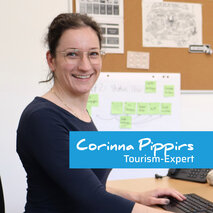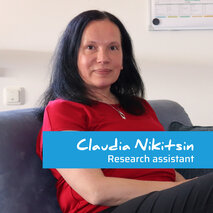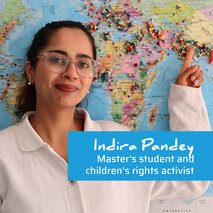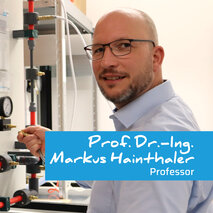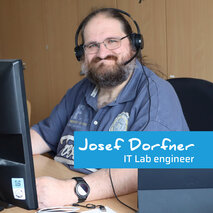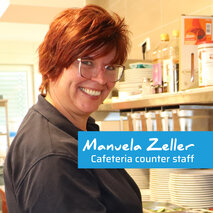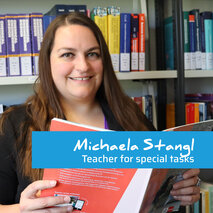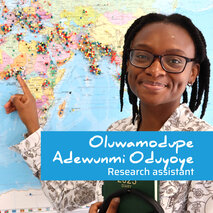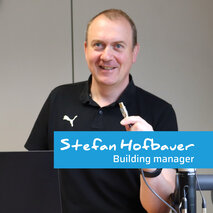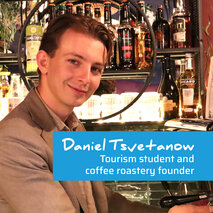european campus rottal-inn
an english campus for students with global aspirations
1,600 students, 23 professors, ten degree programs: Ten years after its founding, the European Campus Rottal-Inn of Deggendorf Institute of Technology is in a strong position. As part of the anniversary celebrations in 2025 in Pfarrkirchen, we are introducing ten people who have contributed to its success story.
Corinna Pippirs
Tourism-Expert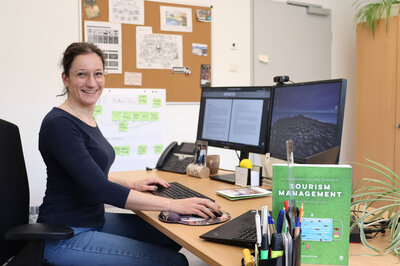
After ten years at the European Campus, Corinna Pippirs, who was born in Allgäu, now calls the district capital of Rottal her adopted home. She came to Pfarrkirchen after completing her training as a tourism manager at a campsite in Ostallgäu. “I'm glad I ended up here,” says Pippirs. After all, she believes that “the people of Lower Bavaria are warm and welcoming to students.” In one of her early jobs as a waitress at the former Gasthof Schachtl, she didn't understand the dialect at first. But she listened carefully, proved herself, and soon felt that the men at the regulars' table were “like a big family.” Pippirs: “It's cool to work in a local inn.”
Regarding her studies: Six years ago, the young woman earned her bachelor's degree in International Tourism Management with the first graduating class in Pfarrkirchen. “We were seen as pioneers and worked together,” Pippirs recalls. Two years later, she earned her master's degree in International Tourism Development. “There were 20 of us from 15 different countries in a family-like atmosphere,” she says of that time. The ECRI researcher appreciates “the internationality and openness” for good reason. She also learned that “the influence of cultural differences on coexistence is greater than expected.” Her example: “While it is important to save face in Asian countries, Germans talk to each other much more directly.”
What Corinna Pippirs likes about tourism is the liveliness of the industry and the contact with people: “It's about giving someone a wonderful vacation.” Even during her studies, she was particularly interested in health tourism. With her master's degree in hand, Corinna Pippirs began working as a research assistant. Her current tasks include surveying guests in cooperation with the Lower Bavarian Thermal SPA Association. The researcher found that “people are satisfied with what the regional thermal SPAS have to offer.” Among the wishes expressed are more loungers and better signage. Pippirs identified the three main reasons for visiting the thermal SPAS as relaxation, having time for oneself, and doing something for one's own health.
Another project called WORK FORce HEALTH & TOURISM focuses on the shortage of skilled workers in the industry. However, according to Pippirs, it is challenging to motivate the participating companies to continue participating in the long term. “But you can't take without giving,” says the research assistant.
The bottom line is that after ten years in Pfarrkirchen, Corinna Pippirs feels right at home and finds that “people in the Allgäu are grumpier.” She promotes studying at ECRI to local high school graduates for the following reasons: “The internationality is exciting and learning in English isn't so bad.”
Pippirs herself would like to continue working at the European Campus. At the same time, she is aiming for a doctorate and hopes: “In about five years, I want to have the title ‘Dr.’ in front of my name.” As one of the first women to join the European Campus, Corinna Pippirs says of the European Campus and its success story: “It's amazing that all this is possible in a small town in Lower Bavaria.”
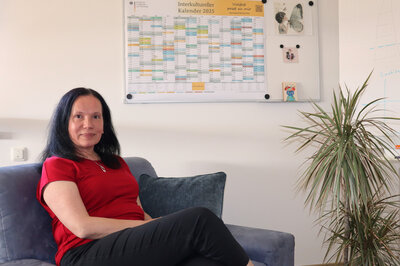
Claudia Nikitsin
Research assistant
At ECRI, everything revolves around studying successfully and graduating with good grades. Of course, problems arise in the everyday life of such a large institution. Anyone looking for help can find it with Claudia Nikitsin. The research assistant is responsible for intercultural psychosocial work, learning counseling, and equality. What she offers: “I provide students and staff with a safe space where they can talk confidentially.”
Like singer Nena, Nikitsin comes from North Rhine-Westphalia. The research assistant's favorite song by Nena is “Wunder gescheh'n” (Miracles Happen). The lyrics say: “Come on, get back up again.” And that is exactly what her daily work is all about. Claudia Nikitsin offers targeted assistance on a wide range of issues. The topics she discusses range from exclusion and diversity to difficulties in finding accommodation and traumatic war experiences. “Or international students miss their families and are homesick,” explains Nikitsin.
She learned about the advantages of Pfarrkirchen from the young people at the European Campus: “Many appreciate the beauty of the landscape, the peace and quiet, and the safety, especially women.” New impressions are also gained. For example, according to Nikitsin, in many other cultures, free choice of partner is not a given.
The research assistant also acts as a learning advisor, often on the subject of procrastination. This unwieldy term refers to the behavior of repeatedly putting off upcoming work until tomorrow. Nikitsin: “I recommend structuring the day, for example by studying in intervals and taking breaks in between.” Last but not least, she is responsible for all issues relating to equality in science, especially between the sexes. “I want to include everyone,” says Nikitsin. All in all, she sees the European Campus Rottal-Inn as a “great ideas workshop.”
Claudia Nikitsin is married, lives in Pfarrkirchen, and has three adult kids. She completed her teacher training in German with a focus on German as a foreign language, pedagogy with a focus on adult education, and educational sciences with a focus on counseling in Paderborn. This was followed by a master's degree in psychosocial counseling and training as a telephone counselor. “My work at the European Campus brings together everything I've done so far,” says Nikitsin. In addition, she has been volunteering at the telephone counseling service for twelve years. “My mother taught me to stand up for other people,” says the research assistant. Ultimately, no one knows better than she does that everyone has to take control of their own lives. If necessary, she helps people to help themselves and advises: “A positive attitude helps in your studies and in life.” And: “No one is too old to learn.”
Indira Pandey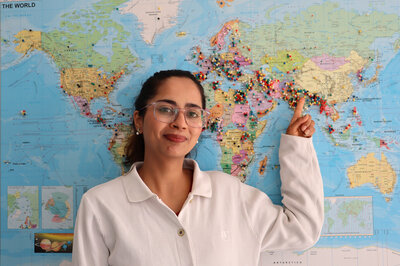
Master's student and children's rights activist
Indira Pandey has been studying for a master's degree in Global Public Health in Pfarrkirchen since October. For good reason, she first completed a bachelor's degree in this subject in her native Nepal. There, she volunteers for children's rights and says: “In order to create a future worth living for girls and boys in Nepal, healthcare, nutrition, and the situation in schools must be improved.”
Indira Pandey appreciates Europe and explains: “Here, education is free, children's rights are respected, and basic needs are met.” She explains why she chose the European Campus for her master's degree: “The courses offered provide a successful mix of working with technological data and content related to social knowledge.”
She completed her bachelor's degree in public health at Tribhuvan University in Nepal, which is named after the former king. Social engagement was already close to her heart at that time. After all, she grew up with workers in her family's home often asking her father for advice. He was president of the automobile and motorcycle construction union and helped with legal matters after work accidents, for example. “My father is my role model with his social commitment,” says the student from Kathmandu.
With this in mind, Indira Pandey volunteers for Children as Zone of Peace (CZOP), based in Kathmandu. This organization coordinates a network of non-governmental organizations that advocate for children's rights. As part of this work, the student visited families in rural areas of her Asian homeland. She encouraged them “not to let their children work, but to send them to school, and not to let girls marry and have children so early.” According to Pandey, the long-term goal of the initiative is “for the Nepalese government to better fulfill its responsibility toward children.”
Indira Pandey wants to make a positive contribution to this. Appropriately, she is learning “how to carry out projects” during her studies at the European Campus. She is getting along very well with life in Pfarrkirchen. “The city is beautiful, the people are friendly, the weather is good,” says the Nepalese woman. After all, she comes from Kathmandu, which she describes as noisy and dirty. She also likes “that everyone learns from everyone else here.” In contrast, in Nepal it is customary for younger people to listen obediently to their elders. Curiously, she saw a train for the first time in Rottal. “There are no railways in the mountains of Nepal,” the student reveals. She misses the traditionally spicy Nepalese rice dishes. “Here in Germany, the food is hardly seasoned,” says Pandey. Spicy salami pizza comforts her.
The bottom line for Indira Pandey at the THD faculty is: “The European Campus offers a platform where people from different countries can meet.” The master's student in global public health discovered that “different countries have different problems.” For example, polio is currently on the rise in Pakistan. Or, according to her, environmental pollution and the threat of climate change affect individual countries differently. “A few weeks ago, the air in Kathmandu was the most polluted in the world, so schools had to be closed,” says Pandey. In contrast, children here are more affected by hot and dry periods. With this in mind, the Nepalese student plans to write her master's thesis on the following topic: How climate change affects children in Europe and South Asia.
In addition to all this, the Nepalese student wants to continue campaigning for the rights of girls and boys in Nepal. At the moment, Indira Pandey is not yet sure where she can best do this. In any case, she believes that global cooperation is needed when it comes to climate and health. “It affects us all,” says the master's student. At the same time, Indira Pandey is convinced: “I am optimistic that we can learn a lot from each other in a globalized world.”
Prof. Dr.-Ing. Markus Hainthaler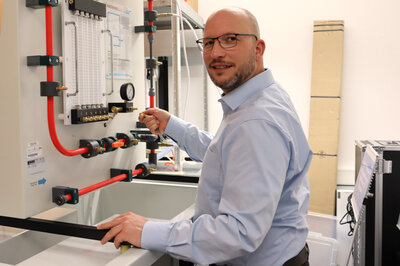
Professor
In many ways, working at the European Campus is something special for Prof. Markus Hainthaler. The scientist, who has strong ties to his homeland, originally comes from Wittibreut and says: “With this professorship in my homeland, I have found my dream job.” Today, the researcher lives with his wife and two children in the district town Pfarrkirchen.
Prof. Hainthaler has been teaching everything related to process engineering and plant construction at the European Campus for almost eight years. For the first five years, he was an endowed professor at Schlagmann Poroton GmbH (Zeilarn). Since 2022, he has been permanently employed at DIT-ECRI, where he heads the “Building Products and Processes” degree program.
His research focuses on the microwave treatment of ceramic building materials such as bricks and insulation materials. Currently, these are still dried and fired using fossil fuels (mainly natural gas). The scientist reports on the state of research: “Things are looking quite good when it comes to drying, but after that it's a matter of firing, and that's a big challenge.” Ideally, microwave treatment will be powered by renewable electricity in the future. “This will make bricks, a building material that has been around for thousands of years, fit for the modern age,” says Hainthaler, quoting Schlagmann's company philosophy. This will enable an important step toward climate neutrality by 2040. The Rottal native is convinced: “With this new approach, we are global pioneers.”
In addition, the research team is keen to use microwaves to produce non-combustible insulation material for both new buildings and the renovation of old buildings. This was triggered by the devastating fire in the exterior wall insulation of Grenfell Tower in London eight years ago. Hainthaler: “After this tragic event, Schlagmann began researching ceramic clay foams with high thermal insulation properties.” These are non-combustible per se. In addition, unlike conventional foamed polymer materials, the new materials can be easily recycled. And the fact that no fossil raw materials (petroleum) are used in their production means that they have a positive ecological balance.
A look back: After attending Wittibreut Elementary School, Hainthaler graduated from high school in Simbach/Inn in 1997. Since completing his doctorate at Friedrich Alexander University in Erlangen, his official academic title has been Prof. Dr.-Ing. Markus Hainthaler, M.Sc. (Univ.) Dipl.-Ing. (FH).
Behind these degrees lies a complex scientific career. Hainthaler first earned his degree in process engineering at the University of Applied Sciences (now Technical University) in Nuremberg. He then worked at Wacker Burghausen for four years as a project engineer for polysilicon plants. He subsequently completed the English master's program in chemical and bioengineering in Erlangen. “This was my first intensive contact with English technical terminology and international students,” recalls the Rottal native. And that's how it is today at the European Campus. He has great respect for the graduates: “They come from far away, experience culture and language shock, and have to earn a living alongside their full-time studies,” says Hainthaler. And: “They study in English, learn German, and earn a degree at our high academic level.”
After completing their studies and doctorates in Nuremberg and Erlangen, the Hainthalers aspired to return to their old home. “This is where we grew up, this is where our relatives are, this is where we feel at home,” says the researcher. For this reason, he applied for the Schlagmann Endowed Professorship while still working on his doctoral thesis – and was successful.
The scientist's father's words often come to mind. Even at a young age, he often tried to teach his classmates and relatives. His father was convinced: “Markus will become a teacher one day.” Today, more than 30 years later, Prof. Hainthaler says: “My dad was right, because as a professor, that's what I am now.”
Josef Dorfner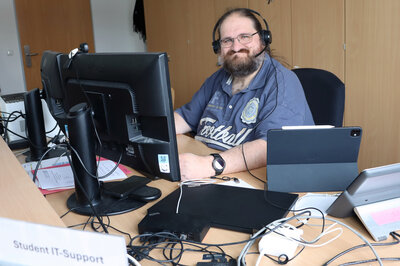
IT Lab engineer
Screens, keyboards, cables, and plugs adorn his desk. Anyone entering the room immediately realizes that Josef Dorfner is responsible for internal IT at the European Campus. He says of his job: “It's varied, and I get to meet people from many different countries.” Together with his colleague Ilona Seifert, who has been with ECRI since the beginning, he has been responsible for “keeping the IT on campus running” for three years.
His expert advice on networks and software is in demand when lectures are broadcast online from lecture halls. Or Dorfner helps at the other end of the hotline as “first level support” when someone has no network connection and cannot access emails. Dorfner knows that “harmonizing the implementation of new technologies with existing systems” is a particular challenge. He also equips new employees with the necessary equipment and trains them.
Josef Dorfner was already an IT fan in his youth. It all started in the 1980s with a Commodore C64. He made his first attempts at programming with this first-generation computer. “Or I tried out the Elite space game,” recalls Dorfner.
Professionally, he trained as an energy systems electronics technician, specializing in industrial engineering. “My company was involved in switch cabinet construction for water treatment in thermal baths in Bad Füssing and Bad Griesbach,” says Dorfner. He then retrained as a Microsoft Certified Professional (MCP). Since then, he has been working as a network technician, including ten years in an electrical store in Altötting.
In keeping with this, Josef Dorfner also works part-time as a sound engineer. As the main mixer for musician Alfons Hasenknopf, he regularly performs at the Wirtshaus im Schlachthof in Munich. Recently, he was responsible for the technical aspects of a performance by cabaret artist Django Asül at the Niederbayernhalle in Ruhstorf.
Dorfner describes the European Campus as “multicultural.” That means: “It's very colorful and international here.” As a married father, he can easily adapt to this. After all, he has six children, some of whom he cares for. The laboratory engineer himself comes from the Passau district and now lives in Simbach/Inn. What he likes about Lower Bavaria is “the down-to-earth, grounded people.” He is one of them.
Josef Dorfner enjoys his work at ECRI. Not least with regard to the planned new university building, he announces in IT jargon: “We are doing everything we can to equip the European Campus with innovative, high-end technology.” In this way, he is doing his part to ensure that everything continues to function smoothly in the future.
Manuela Zeller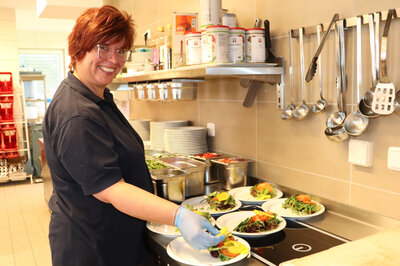
Cafeteria counter staff
It's lunchtime. A glance at the bilingual menu screen tells everyone on campus who's hungry which two dishes are available in the mensateria. “The students especially like chicken with rice,” says Zeller. Lasagna is also very popular. “Everything tastes good with cheese,” says the counter staff about this Italian pasta dish. In any case, one thing is certain: “Studying also goes through the stomach.”
According to Zeller, vegan options such as the recent asparagus risotto without butter and cheese do not sell as well. The same applies to pastries. “Not everyone likes to eat something sweet at lunchtime,” the employee observed. And according to her, many people are unfamiliar with Bavarian specialties such as Apfelkücherl, or apple fritters in English. And: “For example, our Egyptian students don't eat pork, of course,” said the counter staff.
Manuela Zeller cooks sauces, pasta, and rice fresh on site. Other dishes, such as stews, are prepared by the cafeteria in Passau and delivered pre-cooked to Pfarrkirchen. Background: The so called mensateria is not run by the Deggendorf Institute of Technology, but by the Student Services Association of Lower Bavaria and Upper Palatinate. Manuela Zeller is also employed there.
For over a year now, the menu for Pfarrkirchen has been put together in Passau. This makes it difficult to accommodate special requests for main courses on site. Manuela Zeller is always accommodating when it comes to the planned side dishes such as potatoes, rice, or pasta. These can be varied according to preference. “Nothing is impossible” is her motto in this regard. All in all, Manuela Zeller proves to be a jack of all trades in the cafeteria and says: “Together with my colleague, I take care of ordering the goods, cooking, collecting payments, tidying up, and cleaning.”
Zeller first trained as a hairdresser, then moved to the cafeteria of the local KWA nursing school. She has been in charge of catering there since the European Campus was launched ten years ago. “In the beginning, I sold fresh sandwiches in a small room with a kitchenette,” recalls Zeller. Since the opening of the mensateria, a mixture of cafeteria and café, she has been standing behind the counter there and appreciates the family-friendly working hours. In addition, the kitchen staff member from the very beginning is delighted: “The students and employees are super nice, it never gets boring here.”
Growing up in Pfarrkirchen, Manuela Zeller says about the European Campus: “It is a pillar of progress and has changed a lot.” Unfortunately, this also applies to rents on the housing market. Where there is light, there is also shadow. In any case, Zeller wants to remain loyal to the Rottal region: “This is my home, I like the lush green landscape and the tranquility of the small town,” explains the counter staff member.
Incidentally, the Mensteria doesn't just cater to students and staff. “Two elderly, single gentlemen also come by regularly to eat,” reports Manuela Zeller. After all, the facility is open to the public. When she finds the inspiration to cook at home after work, her personal favorite dish is bell peppers stuffed with rice and minced meat and topped with cheese.
Michaela Stangl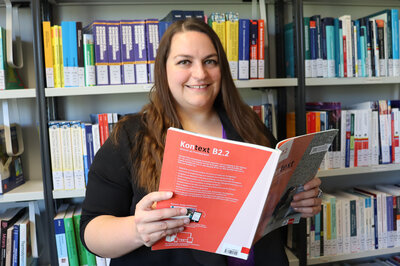
Teacher for special tasks
Michaela Stangl comes from Landshut. She still lives in the capital of Lower Bavaria today and has a second home in Dietersburg. She teaches language courses (German as a foreign language, French, Spanish) at both the THD and the ECRI. There, she focuses on teaching German to international students due to demand.
According to Stangl, her lessons aim to teach four skills: listening comprehension, reading comprehension, grammar/vocabulary, and writing. In addition to standard textbooks, she likes to work with “authentic material” such as films and songs. For example, she has her students translate the following text by the German pop-rock band AnnenMayKantereit into indirect speech in the subjunctive I: „Du hast dich oft gefragt, was mich zerreißt, ich wollte nicht, dass du es weißt“ (“You often wondered what was tearing me apart, I didn't want you to know.”) To practice speaking, Stangl encourages her students to use speed dating to practice German vocabulary and grammar. At the end of the semester, all students take written exams.
At ECRI, German courses are offered at five qualification levels from A1 (beginner) to C1 (expert language skills). For example, an official telc exam at B2 level is mandatory for the Bachelor of Industrial Engineering and Bachelor of International Tourism Management programs. From conversations with students, Stangl knows: “Most of them want to work in Germany after graduation and know how important it is to be able to speak German in the job market.”
Learning a new language is always a challenge. According to the teacher, the students, with their good English skills, try to transfer English language patterns to German, especially at the beginning. This leads to funny mistakes, such as when someone wants to bring poison with them when visiting (Gift means poison in German, but present in English). Stangl sums up her fundamental concern as follows: “Learning a language is like building a house, and that requires a solid foundation.”
About Stangl's career: She completed her Master of Education in International Teaching in French and Spanish at the University of Regensburg. At the same time, she completed additional training in German as a second language and multilingualism counseling there. She currently runs the recently launched language café in the ECRI cafeteria, where students can improve their oral skills and exchange ideas about cultural differences in a relaxed setting every two weeks.
Eight years ago, while still working on her master's thesis, Stangl began teaching at the European Campus. She also successfully led integration courses in Regensburg and Landshut during her studies. As a young teacher, she hardly stands out among the students. When the state parliament presidium recently visited the European Campus, state parliament president Ilse Aigner asked the students about their origins and their courses of study during a meeting with them. When she asked Michaela Stangl, her answer was: “I am the lecturer and I come from Landshut.”
Stangl sees her current job as a calling. Professors, staff, and their families also take part in her German courses. At the European Campus, the teacher particularly appreciates “the family atmosphere, the friendly staff, and the cultural diversity.” She likes “the proximity to the thermal baths, the beautiful nature, and the good air” in Rottal. In addition, life here is reasonably affordable compared to the Munich-Landshut metropolitan area. Despite all this, her heart remains attached to her hometown, which is why she says: “I can't get away from Landshut.” So Michaela Stangl cheerfully commutes back and forth between the Isar, Danube, and Rott rivers with a rolling suitcase full of German books.
Oluwamodupe Adewunmi Oduyoye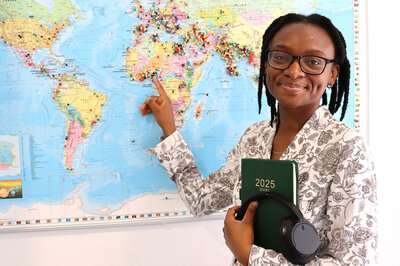
Research assistant
In her native Nigeria, Oluwamodupe Adewunmi Oduyoye once visited a nature conservation center called Agodi Gardens. The poor condition of the attraction inspired her to think: “I want to study tourism so I can improve places like this.” So, three years ago, the young woman came to Pfarrkirchen with a bachelor's degree in history and international studies. “I found the program on a platform run by the German Academic Exchange Service (DAAD),” says the Nigerian. What she liked about the European Campus was “that the Master's program in International Tourism Development is very practice-oriented.” Once there, she was delighted to find that “the lecturers supported me very well during my studies.” Based on her own experience, she encourages all newcomers to “make the most of your opportunities.”
Oluwamodupe Adewunmi Oduyoye comes from the port city of Lagos. Her father is Nigerian and her mother is from Jamaica. After completing her bachelor's degree at Bowen University in her home country, she became involved with the aid organization “Provide a Meal.” Oduyoye: “This NGO tries to provide sustainable care for people in need.”
Her master's thesis in Pfarrkirchen also focused on the continent of her origin. Topic: The potential of traditional African medicine for SPA tourism. Her thesis deals, for example, with the exploration of herbal medicine, including black soap. “This is made from shea butter, cocoa pod and plantain ash, and palm kernel oil,” says the tourism expert. Black soap is recommended for skin care, especially for acne or eczema, and also for exfoliation.
Since successfully completing her master's degree last fall, the young researcher has been deepening the approaches of her master's thesis as a research assistant in the field of tourism. In addition, she is one of the initiators of the ECRI Art Club at the European Campus, which collaborates creatively with the local secondary school (Realschule). “Art is a very special way for people to express themselves,” says Oluwamodupe Adewunmi Oduyoye, who is known as Mo on campus. In her free time, the young woman enjoys playing the guitar and conducting the choir of the Evangelical Free Church.
The Nigerian says of Pfarrkirchen: “I think it's a friendly community.” In her experience, it's easy to get involved here. For example, Oduyoye did the necessary washing up at the local Christmas market during her first job as a student in Germany. Or recently, she and an energetic group of campus helpers lent a hand to the Rottal classic car enthusiasts at the classic car meet (Oldtimertreffen) at the local racetrack.
Oluwamodupe Adewunmi Oduyoye appreciates the European Campus: “People from different countries with different perspectives and different solutions to problems come together here.” And in her experience, that helps to “look at things holistically.”
Stefan Hofbauer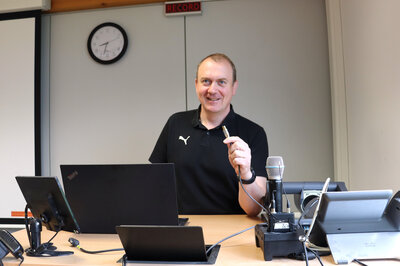
Building manager
Hofbauer comes from a farm near Triftern. Today, he lives there with his wife and two children. The skilled craftsman from Altbach Valley is a trained heating and ventilation engineer (now a plant mechanic). After completing his apprenticeship and working for many years at the company where he trained, he wanted to try something new. For the past three years, he has been responsible for building management at the European Campus. Hofbauer: “In the past, we used to call this a janitor (Hausmeister).”
When he is not at his desk, he is busy in one of the two campus buildings. If necessary, Hofbauer helps a professor connect their tablet in the lecture hall. Or he assists the laboratory engineers in setting up new equipment. He also coordinates the use of external companies when repairs are needed, the elevator is being serviced, or, as was recently the case, new vinyl flooring is replacing the old carpet. He was the right person to optimize the hybrid heating system installed in the SILC laboratory building. “We've been saving a lot of gas since then,” says Hofbauer after the work is done. The craftsman says with good reason: “I am a versatile problem solver.”
In his private life, Stefan Hofbauer has been involved with the Lengsham Volunteer Fire Department for more than 30 years, most recently as commander for six years. In keeping with this, he serves as safety officer at ECRI. His responsibilities include identifying and eliminating safety risks in the day-to-day operations of the university, as well as organizing and carrying out all maintenance work to ensure that the building runs smoothly and teaching can continue without disruption. And when a few people recently got stuck in the elevator, he rushed to the scene alongside the Pfarrkirchen fire department, which had been alerted.
According to Hofbauer, the European Campus embodies “internationality in the region.” Through contact with the students, he was able to “brush up on his rusty English.” In addition, he says, many of them like to test their acquired German language skills. Either way, he appreciates the good cooperation and is happy: “Every day I experience something new.”
He was actively involved in the planning for the tenth anniversary of the European Campus. For example, he coordinated the tent construction with the city and is in contact with the district that owns the laboratory building. Due to the variety of tasks, the building manager feels that his work is “like winning the lottery.” Stefan Hofbauer is already looking forward to continuing to be actively involved in the planned new construction of the European Campus.
Daniel Tsvetanow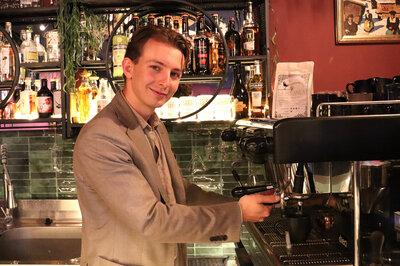
Tourism student and coffee roastery founder
La Botanica. That is the name of the coffee roastery that the young Bulgarian has been running in Schönau for five years. Under the same name, Daniel Tsvetanow has been offering his products in a coffee house with a wine bar and terrace in Eggenfelden since the beginning of this year. In the café, guests sit on upholstered furniture with a history under palm fronds and bamboo. “Some have said that the atmosphere is reminiscent of Cuba,” says Tsvetanow.
Having always been interested in the hospitality industry, he began studying at the European Campus International Tourism Management eight years ago. At that time, he spoke Bulgarian, English, French, and Russian, but no German. That quickly changed. Ultimately, Daniel Tsvetanow feels at home here and believes that “Germany offers young people many opportunities.” Daniel Tsvetanow says of Germans: “They know what they want, think in a structured way, and constantly strive for improvement.” In his experience, many international students take things as they come, but are more willing to experiment.
The Eastern European considers the European Campus Rottal-Inn to be an “intercultural space.” There, he himself experienced “how differently people think.” This broadened his worldview. At ECRI, the Bulgarian appreciated “learning in small groups and supporting each other.” He has stayed in touch with many people from that time. His advice to current students: “Give your dream a chance.” Of course, the prerequisite for this is knowing what you want. It worked out perfectly for him. Tsvetanow: “My studies helped me understand what makes a successful company – including when it comes to German bureaucracy.”
For good reason, he repeatedly worked as a barista while he was a student, for example at the Hotel Sonnengut in Bad Birnbach. With the opening of the La Botanica coffee roastery, he took the plunge into self-employment. He expanded the young company several times. Today, Tsvetnaow supplies a number of delicatessens and supermarkets as well as online customers. Recently, the next step was on the agenda. The young entrepreneur painstakingly converted the premises of a former shoe factory between Landshuter Straße and Schellenbruckplatz into a café and says: “Here I can see the customers' reaction to my products first-hand.”
The name La Botanica is reflected in the café's design. Tsvetanow pays great attention to detail to create the right atmosphere. One of the cornerstones of his concept is “offering quality and freshness”. After all, the beans should not lose their aroma. When Daniel Tsvetanow finds time to treat himself to a cup of coffee, he prefers “a Brazilian Arabica bean that tastes a little like chocolate.” Through it all, his big dream remains: “I want my brand to be known throughout Bavaria in ten years.”
